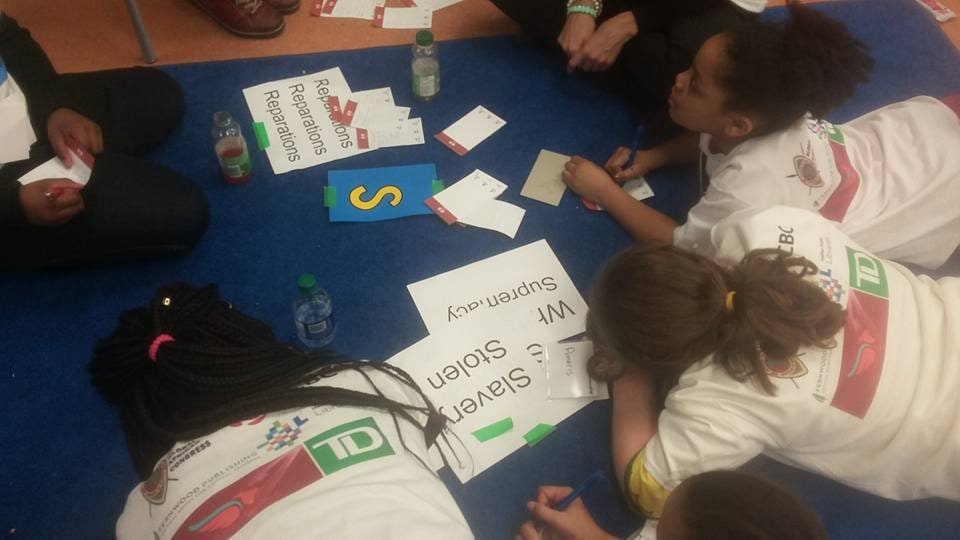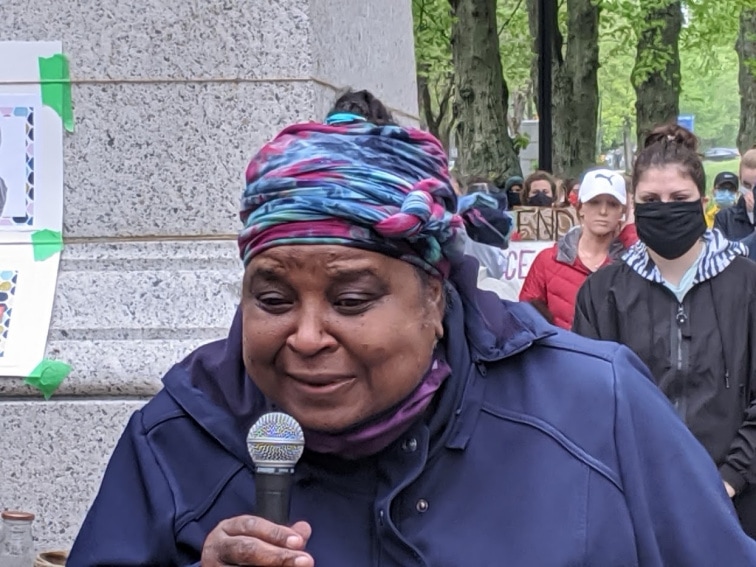
KJIPUKTUK (Halifax) – “ Never in my born days would I have imagined the size and persistence of the anti-racism protests taking place here in Halifax ever since George Floyd was murdered in late May,” says Dr. Lynn Jones.
Keep in mind that Jones in her life has seen a lot of Nova Scotia protest movements rise and fall.
“Some of the people who are stepping up have never done so before. They’re scared, but they’re bringing forward concerns that they never raised before. Yes, there are feelings of hopelessness, but I also see it as a great opportunity.”
The current protests against police brutality and systemic racism, in the US, Canada, and Halifax for that matter, extend beyond anger over individual misdeeds by racist cops.
People want to see justice for George Floyd, Chantel Moore, Rodney Levi and so many others, but, as the calls for abolishing and defunding the police indicate, this time people want underlying systemic causes addressed as well.
That may give these protests a bit more staying power.
There certainly seems to be a hunger to learn about racism, especially about how it manifests in policing, says Errol Sharpe, founder and co-owner of Fernwood Publishing, a Nova Scotia and Winnipeg-based publishing house that focuses on books that challenge the status quo.
The two Fernwood books about race most in demand at this time are Robyn Maynard’s Policing Black Lives, and Ingrid Waldron’s There’s Something in the Water, says Sharpe.
“We ran a reprint of Robyn Maynard’s book two weeks ago, and it has just gone in for another reprint already. There’s an awful lot of people out there that have been made aware of this issue in a way that they never have before,” Sharpe says. “And when Ellen Page made the documentary that’s now on Netflix we ran another print of There’s Something in the Water, and that reprint pretty much ran out as well.”
“There are very few books in Canada that deal with the policing of Black and Indigenous people. We also did a book about the police and indigenous activism (Policing Indigenous Movements), but that’s pretty well it,” Sharpe says.
There are some other books in the Fernwood portfolio Sharpe wishes would get that extra attention. He mentions two young adult historic novels by African Nova Scotian author Gloria Ann Wesley, Chasing Freedom, and If This Is Freedom, about the Loyalist settlement of Birchtown, and when that ends in disappointment, the subsequent move to Sierra Leone for a better life.
Another book that is dear to Sharpe’s heart is R is for Reparations. This wonderful little book was written in a day by some 30 children from in and around Halifax, aged 7 to 12. It’s sponsored by the local chapter of the Global Afrikan Congress, and has the kids talking about their encounters with racism and bullying, and what to do about it.
See also: Book review: R is for reparations – Young activists speaking their truth
That book should be a go-to book in Nova Scotia schools, Sharpe says.

Barbados certainly agrees. That small island country in the West Indies bought copies for all its schools, says Lynn Jones, who is associated with the Nova Scotia chapter of the Global Afrikan Congress, and has been championing the cause for reparations in Nova Scotia like no other.
“That book is phenomenal, there’s no other word,”says Jones. “I thought, children know a lot, and they are naturally engaged in the idea of reparations. That’s when I got in touch with Errol (Sharpe) and said, I want to make a book written by kids and I want to do it in a day. He said, are you crazy? And I said, no, I think we can do it. And we did.”
The writing event took place in the Halifax North End Library. All kids were welcome, and they traveled an underground railroad by train. At each station there would be dancers, visual artists or poets to help them articulate responses to a particular issue related to racism and reparations.
“Policing is a very good thing to focus on, as are racist monuments. But what boggles my mind is how you can discuss these things without talking about reparations. This is totally understood in the US and in the Carribean, but here we still think of reparations as an add-on, rather than being a natural part of these discussions,” Jones says.
See also: Slavery is a crime against humanity, and there will be no impunity, Halifax audience told
Back to the current protests, and whether they have staying power.
“Whether it will last, I don’t worry about that,” says Jones. “I’m not even worried about what comes later. I don’t care, in the sense that I’m here for the moment. I’m going to continue to do what I do. But I got more people on board to do it with. What comes out at the end? I don’t know.”
See also: Community meeting explores the case for reparations to African Nova Scotians
With a special thanks to our generous donors who make publication of the Nova Scotia Advocate possible.
Subscribe to the Nova Scotia Advocate weekly digest and never miss an article again. It’s free!



